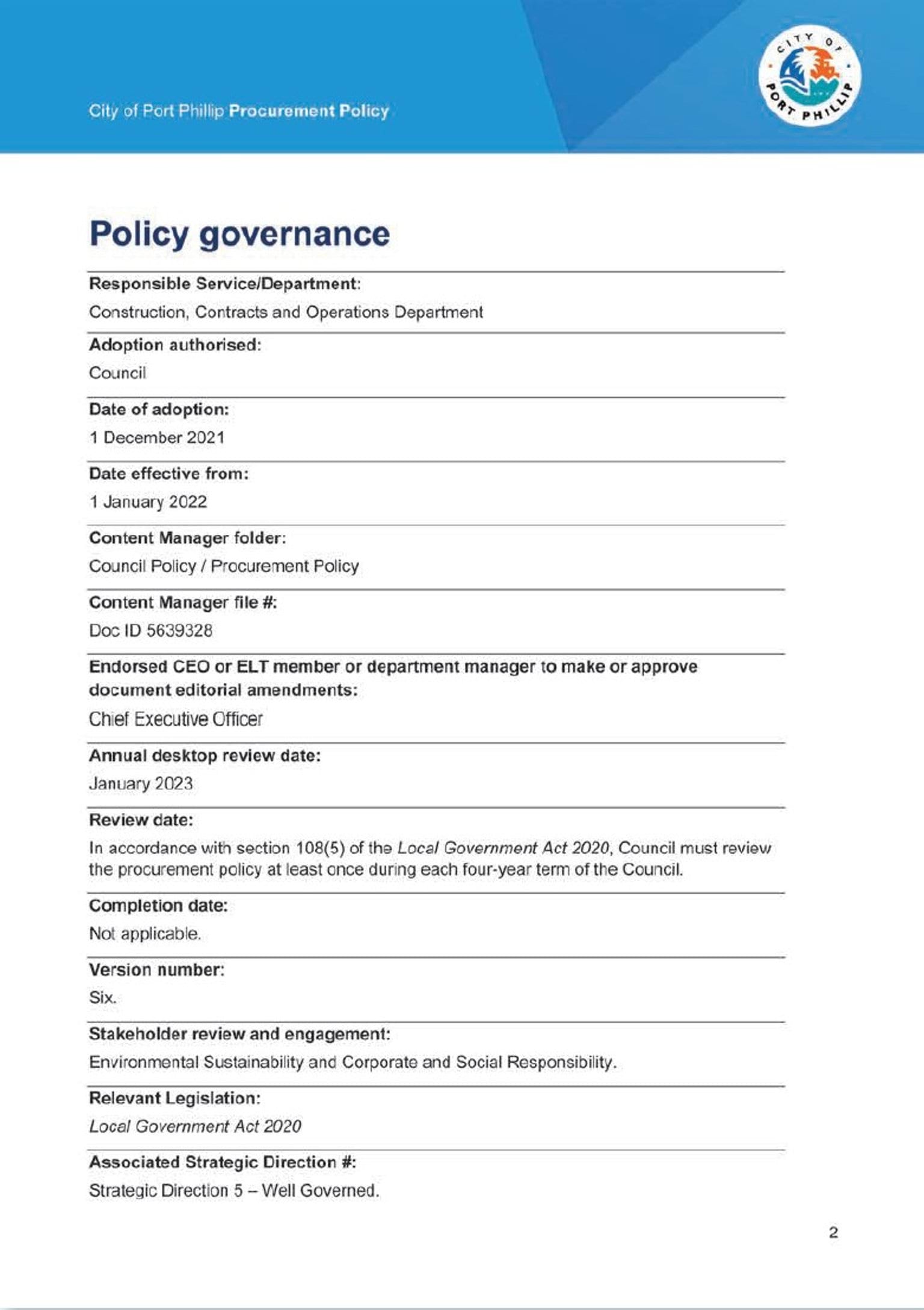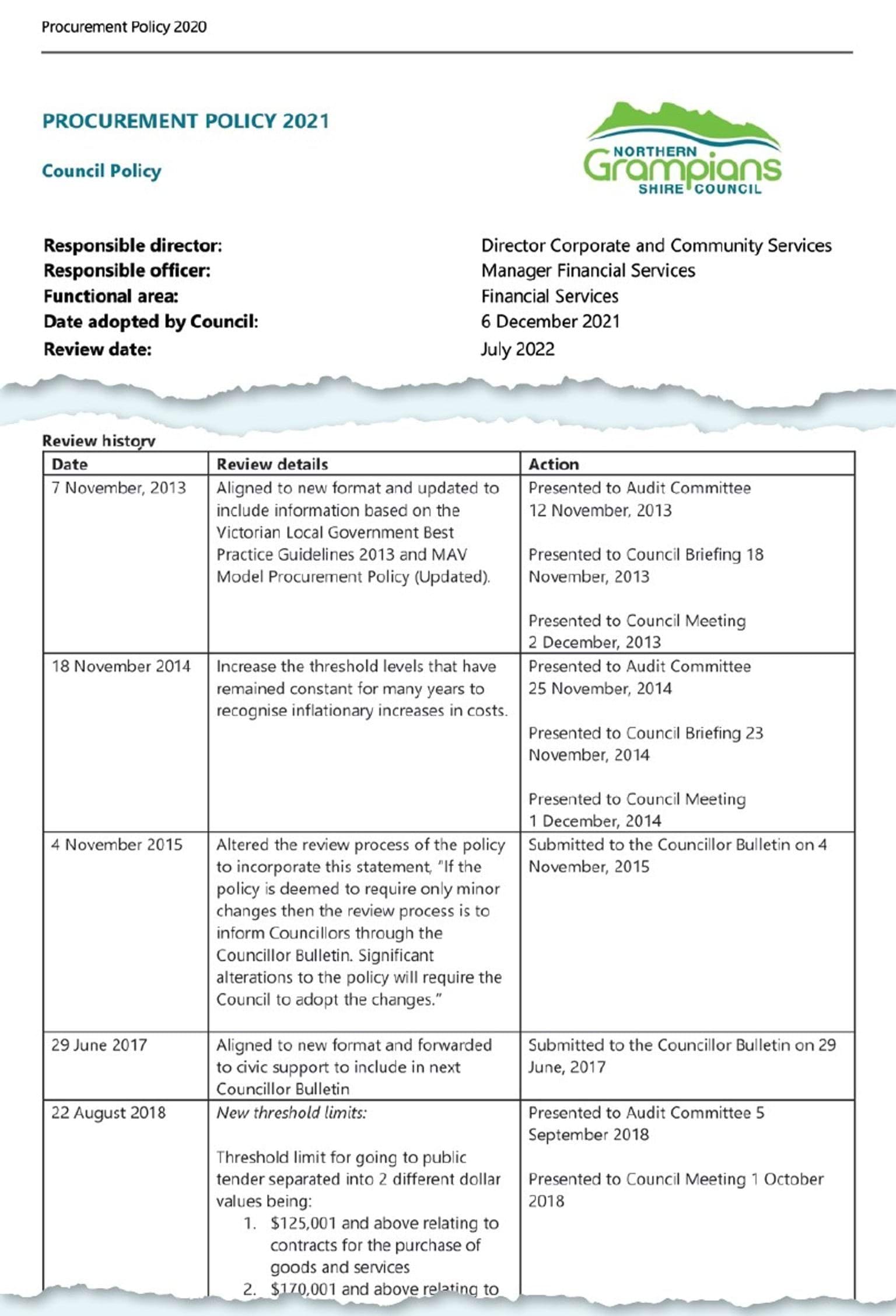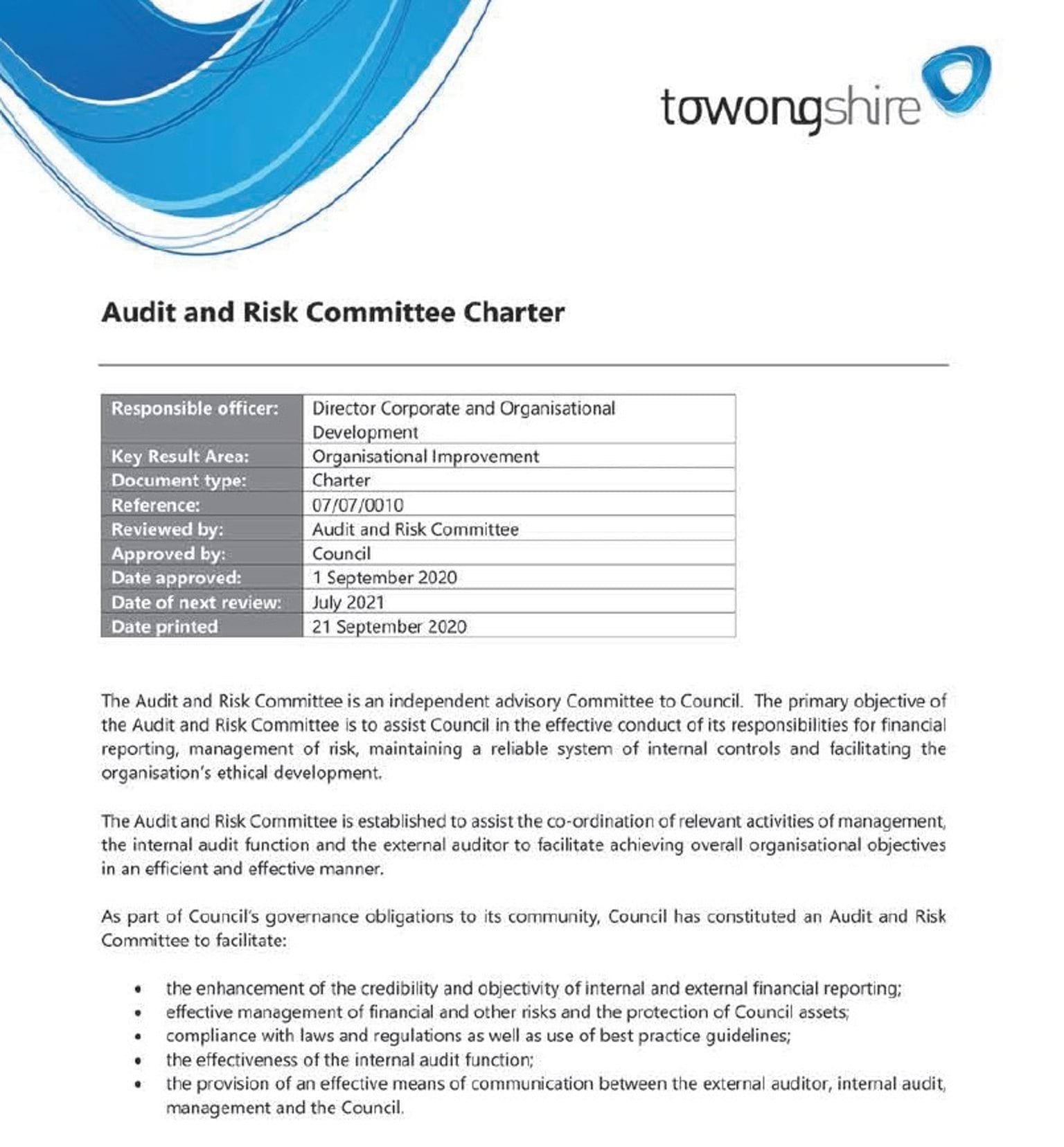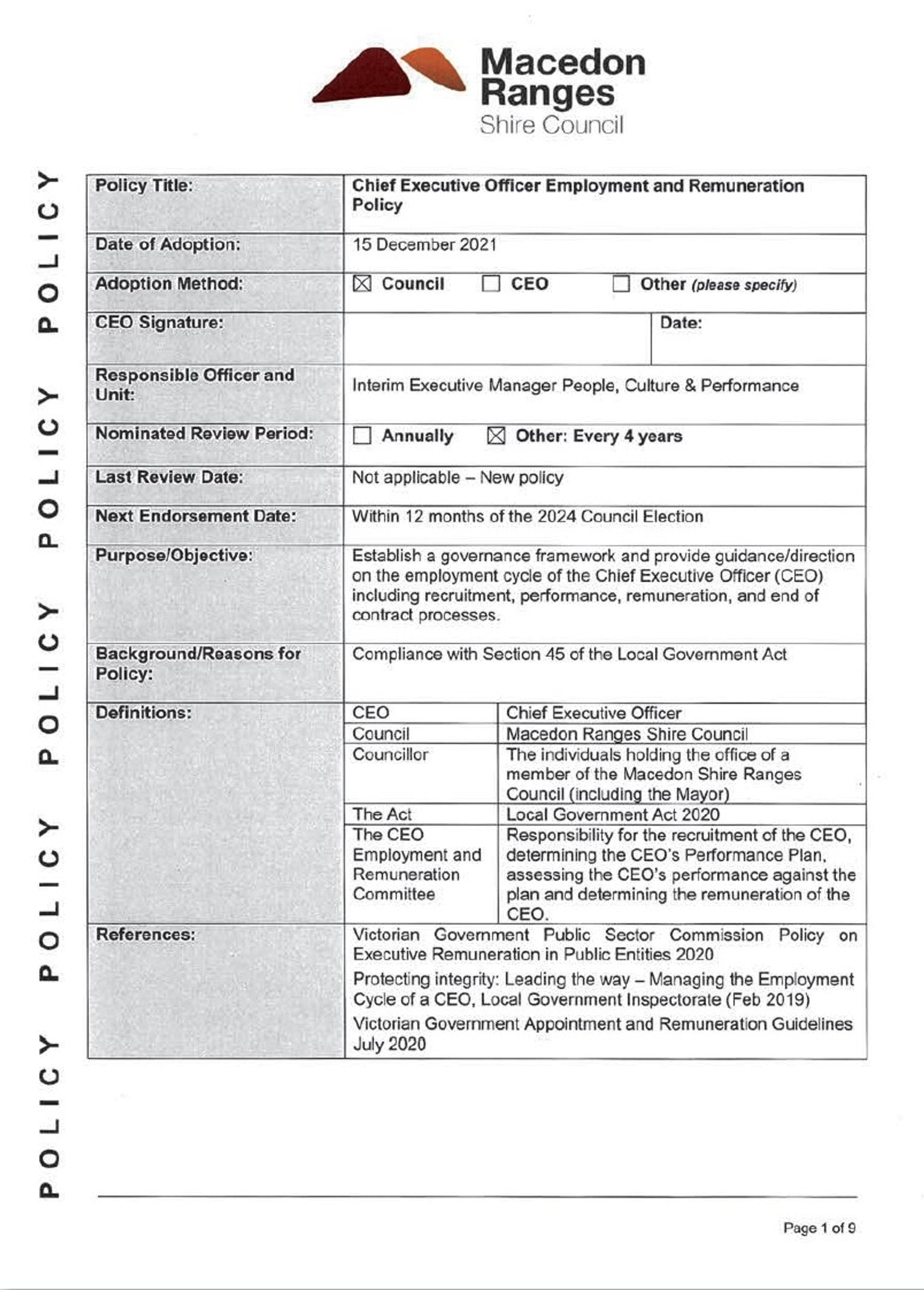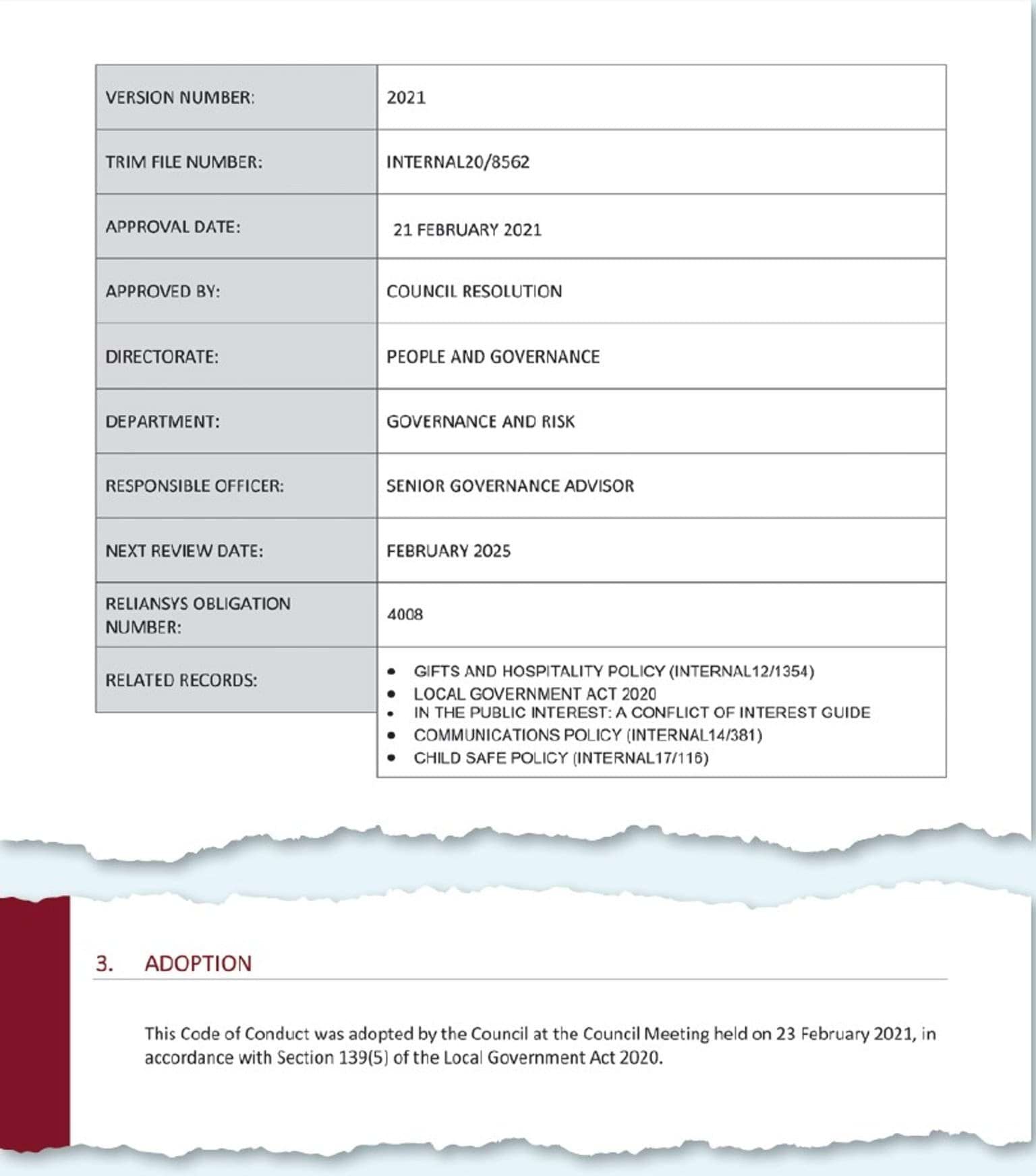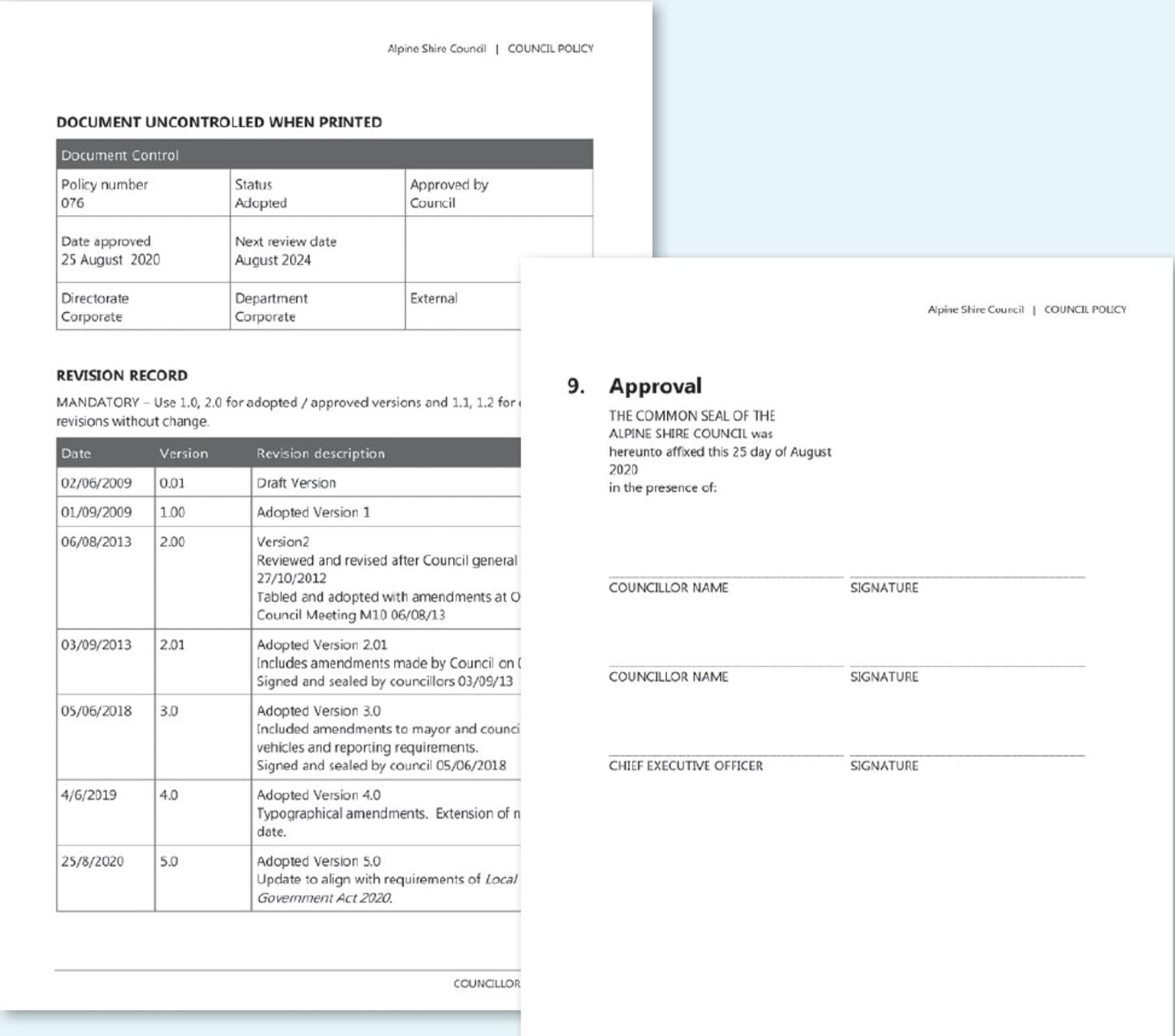- Date:
- 16 Jan 2023
Foreword
The most significant reform of Victoria’s local government law in decades came into effect at a difficult time for Victoria’s 79 councils. Tasked with meeting the requirements of the new Local Government Act 2020, councils were also dealing with the considerable challenge of a global pandemic.
The implementation of the Act in mid-2020, placed significant governance requirements on councils across an 18-month period. It is our role to measure compliance across the local government sector, so in early 2022, we asked councils to supply us with new and updated policies required by the new legislation.
All 79 councils promptly complied with our request. This report is the result of our review of more than 1,000 individual policies and documents.
Overall, the review found that councils had very high rates of compliance with the strict deadlines required under the Act. The average compliance rate for the adoption of all policies and documents by the 79 councils was 93 per cent.
We were pleased to see that councils had acted quickly in adopting the new and updated policies required by the new Act – despite the challenging circumstances in the past two years.
We also selected a random sample of policies from a range of councils for a closer look. This deep dive revealed some minor issues but overall, the quality of policies was pleasing. We have made eight recommendations in this report to help councils improve their documentation and to alert them to a small number of common errors. We have also made a further recommendation to Local Government Victoria to provide clarification on an area of the Act.
Our project also aimed to provide councils with a resource of sample policies and documents which would allow them to compare to their own policies. The policies we chose met legislative requirements and came from a cross section of councils. These sample policies are now available on our website in the ‘Resources for councils’ section.
We hope this policy review will help lift capability and compliance across the sector.
I would like to thank those staff in all 79 councils for their prompt responses to our request and also commend them on the quality of the material provided to us.
Michael Stefanovic AM
Chief Municipal Inspector
January 2023
Background
In 2020, the Local Government Act 2020 came into force. The Victorian Government wanted the new Act to increase accountability and transparency as well as improving financial management and community engagement.
The Act was proclaimed in 4 stages, starting on 6 April 2020, with the final stage being proclaimed on 1 July 2021. The multi-step process included a focus on:
- electoral processes, transparency and community engagement
- integrity and governance
- strategic planning and reporting
- procurement, complaints handling and key regulations that articulated the powers of councils.
The implementation of the new Act required councils to develop a suite of new policies and update or amend existing policies. The Act required councils to develop or adopt each policy within a set timeframe.
Unfortunately, councils were faced with the difficulty of dealing with the COVID-19 pandemic during the majority of the period when the new Act was being implemented. Councils had to support their local communities and had a large percentage of staff working from home. Despite this, councils were still required to adopt the new or amended policies prior to the legislated deadlines.
Our role: Local Government Inspectorate
The Local Government Inspectorate is the lead integrity agency for Victorian councils. We are an independent agency that ensures Victoria’s councils follow the Local Government Act. Our responsibilities include:
- accepting and investigating complaints about council operations, including councillors and council staff
- monitoring governance and compliance with the Act
- providing guidance and education for councils
- encouraging transparency and accountability across the sector.
Our role is to ensure compliance by investigating and prosecuting breaches of the provisions in the 2020 Act and prior to it coming into force, the 1989 Act.
We also provide guidance and education by undertaking reviews and audits and providing suggestions and recommendations to improve procedures and potential amendments to legislation.
Scope of review
In early 2022, we started a project to identify the key documentation councils were required to have in place and measure the success of each of the 79 councils’ in meeting those requirements.
The full scope of the project was to:
- identify which of the new and amended policies required under the Act we should review
- request that all 79 councils provide the Inspectorate with a copy of the policies covered by our review
- test that each of the requested policies was adopted prior to, or on the date required by the Act
- randomly sample a range of requested policies to ensure they were compliant with the legislation
- publish a selection of example policies on the Inspectorate’s website so they can be used as a resource for councils to compare their own policies against.1
Footnote
1 The selected policies were not necessarily best-practice policies but were a cross-section of compliant policies that had the characteristics of a good policy.
Selected policies
We selected the following policies to review as we identified that they were fundamental to councils delivering good governance:
- Councillor Code of Conduct
- Council Expense Policy
- Gift Policy
- Audit and Risk Committee Charter
- Complaints Policy
- Procurement Policy
- Community Engagement Policy
- Public Transparency Policy
- CEO Employment and Remuneration Policy
- Governance Rules.
We also asked councils to provide evidence that Councillor inductions were completed, as required, following the 2020 council elections.
In addition, we requested councils provide us with any existing policies that covered or included councillor relationships with:
- council staff
- other councillors
- external third parties.
Review
In February 2022, we contacted all Victorian councils requesting they provide us with the above policies. We asked councils to provide us with the name of a contact person at their organisation and provided each council with a link so they could upload the documents onto our system.
Despite a number of councils missing our deadline and others having technical difficulties, we received the requested documents for all 79 councils.
The initial review of about 1,000 policies and other documents comprised of:
- recording the dates that each was adopted
- conducting a cursory review to identify those that demonstrated compliance with the Act at a high level
- checking that documentation was well presented.
Once we had completed the initial review, we randomly chose some policies from a range of councils to take a closer look at them to assess the quality.
Compliance with timeframes for adoption
The Act had strict time frames for the adoption of a number of policies and documents. The table below sets out the compliance rate for all Victorian councils for each policy or document.
| Policy or document | Compliance rate |
|---|---|
| Governance rules | 87% |
| Councillor code of conduct | 97% |
| Council expenses policy | 94% |
| Gift policy | 95% |
| Audit and risk charter | 90% |
| Complaints policy | 99% |
| Procurement policy | 97% |
| Community engagement policy | 91% |
| Public transparency policy | 95% |
| Councillor induction | 79% |
| CEO employment and remuneration policy | 95% |
The level of compliance across the sector was extremely high, with 9 of the 11 topics recording compliance rates of over 90%. Another topic had a compliance rate of 87%. The outlier was councillor inductions with a compliance rate of 79%.
Because the requirements were mandatory, it was anticipated that compliance rates would be high. While the target for councils to comply was 100%, we considered that the results achieved by councils was more than satisfactory given the extraordinary circumstances that prevailed at the time.
Under section 32(1) of the Act, councillors must complete councillor induction training within 6 months after they take the oath or affirmation of office. Under section 32(3), councillors must then make a written declaration before the CEO that states that they have completed the training and then sign and date the declaration.
As the councillor induction compliance rate was significantly lower than expected, we sought feedback from a number of councils to understand why. The feedback indicated that most had facilitated the training, and it had been completed within the prescribed timeframe by each councillor, however they were unaware that each councillor was required to sign off to confirm the training had been completed.
It should be noted that under the Act, a councillor’s allowance is to be withheld until they have completed their induction training and - just as importantly - have also made the written declaration.
Recommendation
1. Councils must ensure that:
- the councillor induction training has been completed by councillors by the required time as per section 32 (1) of the Act
- confirmation of the training has been signed off by councillors and the CEO to confirm it has been completed as per section 32 (3) of the Act.
Issues uncovered
We did not have the resources to review and give feedback on each policy. However, when we randomly selected councils and reviewed policies and documents in more details, we found a small number of anomalies.
CEO Employment and Remuneration Policy
A number of policies we reviewed included the statement:
“Council must appoint a CEO employment and remuneration matters advisory committee in accordance with section s45 (2)”.
Section 45(1) of the Act requires councils to adopt a CEO Employment and Remuneration Policy. Section 45(2) of the Act states:
A Chief Executive Officer Employment and Remuneration Policy must – (a) provide for the Council to obtain independent professional advice in relation to the matters dealt with in the Chief Executive Officer Employment and Remuneration Policy; and (b) provide for the following - (1) the recruitment and appointment process; (2) provisions to be included in the contract of employment; (3) performance monitoring; (4) an annual review; and (c) include any other matters prescribed by the regulations.
There is no specific reference that mandates that councils ‘must’ appoint a CEO employment and remuneration matters advisory committee. For clarity, we sought advice from Local Government Victoria (LGV) which said that “…section 45(2) of the Act does not explicitly require councils to establish a CEO employment and remuneration advisory committee”.
However, LGV added that “it is good practice for councils to do so, and for the committee to be constituted by all councillors and chaired by an independent person who provides professional advice in relation to the matters contained in the CEO employment and remuneration policy”.
It was also noted that some councils have differently interpreted Section 45(2)(a) of the Act, in regard to obtaining independent professional advice. We sought further clarity from LGV about whether it was mandatory for an independent person to be appointed to a committee or if the committee and council policy allowed independent advice to be provided instead. LGV said:
“It is at councils’ discretion how they go about obtaining independent professional advice under section 45(2).
While it is not mandatory for councils to establish a CEO employment and remuneration advisory committee or appoint an independent person to that committee, LGV believes it is good practice for councils to do so.
“Further, an advisory committee of this nature would not have the power to make decisions on behalf of the council. Any voting rights of committee members would only be in an advisory capacity and relate to the making for recommendations to the council for decision.”
The Inspectorate believes it would benefit councils to have this confusion clarified with formal guidance from LGV or a change to the legislation.
Recommendation
2. LGV should provide formal guidance about whether councils should appoint a CEO employment and remuneration matters advisory committee, what its powers should be and how independent professional advice should be obtained.
Governance Rules and Election Period Policy
Section 60 of the Act requires the development of Governance Rules, including an Election Period Policy in accordance with section 69. We commend the sector in its effort in meeting the timelines and statutory requirements.
However, when we randomly selected a number of examples of Governance Rules to review in depth, we identified some discrepancies in the interpretation and requirements of the Act.
Firstly, we saw examples of Governance Rules where clauses had been inserted relating to the use of the common seal.
Section 14(2) (c)says the common seal of a council must be used in accordance with any applicable local law.
Meanwhile, Section 60(1) requires councils to ‘develop adopt and keep in force Governance Rules’ which are outlined in Section 60 and in the Local Government (Governance and Integrity) Regulations 2020. However, neither s 60(1) nor the Regulations state that the common seal should be included in the Governance Rules.
Secondly, a number of councils’ Election Period Policies included a requirement for the CEO to certify council publications. However, this was a requirement under Section 55D of the Local Government Act 1989 (1989 Act).
It is no longer a requirement. Councils should remove any references to certification by the CEO and references to Section 290 of 1989 Act.
Recommendations
3. Councils should note that the common seal must be used in accordance with any applicable local law rather than being incorporated in the Governance Rules.
4. Councils should note there is no current requirement in their Election Period Policy for the CEO to certify council publications, which was required under the 1989 Act.
Format of policies
During our review, we noticed there was no consistency in the way councils formatted their policies. This is due to the fact that there is no model policy structure or legislative requirement to follow a model structure.
The main purpose of our review was to record the date each policy was adopted to allow us to measure compliance.
While some councils provided a separate record of the adopted dates, in most cases, we had to obtain the adoption date from the policy itself.
In several cases, the adoption date was not detailed on the policy, nor was there any form of document history, or version control. Most also did not include the date of the ‘next review’. In those instances, we searched through council minutes to identify the adoption date.
We cannot mandate the format councils use for their policies, however we see advantages in councils formatting all policies, similarly, containing standard information. Standard information could include the adoption date, date of next review as well as version control where any changes made to the document can be recorded.
In addition, councils may consider recording where a delegated senior staff member and/or the Mayor where appropriate have signed off on new and updated policies to confirm their endorsement of the policy before it goes to the council for approval. There are benefits to each policy having a suitable audit trail.
Appendix A has a small selection of policies where the information above was included and set out in a manner which was easily identified. See Appendix A for more detail.
Recommendation
5. Councils may consider including the following on all council policies:
- the date adopted
- the date of next review
- a summary of changes made to the policy.
Audit and Risk Committee
When reviewing Audit and Risk Committee Charters, it was also apparent that there were inconsistencies across the sector, particularly in terms of sign off. Councils variously had a combination of the CEO, Committee chair, Committee members, the Mayor sign off on the document, and many did not have it signed off at all.
While the Charter must go before the Council for adoption, to increase accountability, and ensure currency, the Inspectorate would like to see each charter signed off accordingly, particularly where there has been a change to the membership.
Recommendation
6. Councils should consider having the Audit and Risk Committee Charter signed off at each renewal by the:
- CEO
- Committee chair
- Mayor/Committee members (at the council’s discretion).
Policies covering councillor relationships
On top of the formal review of policies required under the new Act, we also requested councils provide us with internal policies that related to councillor relationships with staff, other councillors and external third parties.
The table below showed the rate of councils who had policies covering these relationships.
| Relationship covered by policy | Council staff | Other councillors | External third parties |
|---|---|---|---|
| Percentage of councils with a policy | 49% | 4% | 0 |
This exercise confirmed that nearly half of the councils developed and maintained a document that addressed councillor and staff interactions. This document was separate to the respective codes of conduct. There is no formal requirement to do so, but it is recommended that a stand-alone policy be created.
There is also no requirement to develop a policy to address conduct with other councillors aside from the code of conduct. These results show that councils have chosen not to develop a policy to guide this relationship – separate to the mandatory code of conduct.
Notably, no council provided us with a document that specifically addressed interactions with external third parties. We made the request to identify whether councils specifically address interaction with third parties – such as property developers or real estate agents – where sharing information could compromise future decision making. There is no specific requirement for councils to have such a policy. However historically, this is an area that has raised concerns between councillors, and across local communities. These meetings are often considered as meeting with key local stakeholders, but they raise integrity issues if they are not dealt with and managed appropriately.
Recommendations
7. Councils are strongly encouraged to develop a policy to guide the relationships and interactions between councillors and council staff.
8. Councils should consider developing a policy for councillors interreacting with third parties in an open and transparent way so that the public can be confident that decision-making is taking place in an unbiased way.
Sample policies for self assessment
We have identified a number of policies which suitably meet the requirements of the Act and have published them on our website as a resource to help councils. We included these policies as we consider them to be of value to councils wishing to carry out a self-assessment of their own policies by comparing them to the policies we have selected.
We chose several examples for each topic to provide a good cross section for comparison. These sample council policies can be found on our website in the ‘Resources for councils’ section.
The policies identified are:
- Council expense policy
- Gift policy
- Audit and Risk Committee Charter
- Complaints policy
- Procurement policy
- Community engagement policy
- Public transparency policy
- Governance rules.
Recommendation
9. Councils should benchmark their own policies by comparing them with policies published on our website. this can be done by visiting the
Inspectorate’s website to review the sample policies from the cross section of policies published.
Appendix A
Appendix A contains examples of where councils have clearly set out key information about policies, such as approval date, review date and who is responsible for the policy.
The following are examples of where councils have clearly set out key information about policies, such as approval date, review date and who is responsible for the policy.


